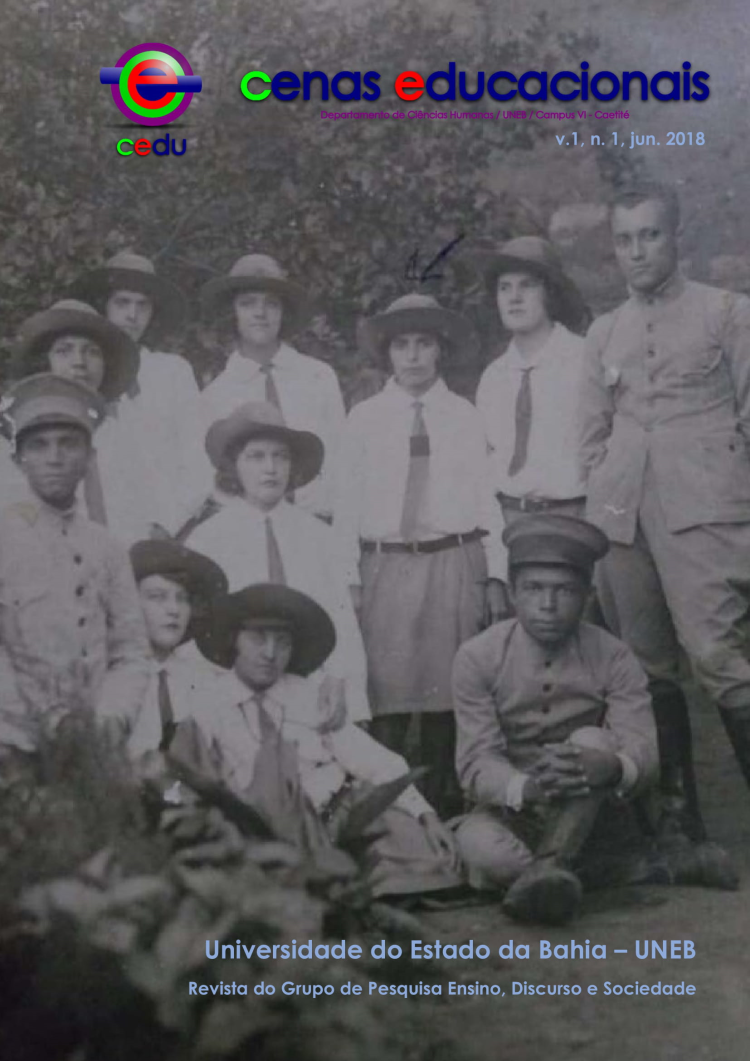EDUCATION OF YOUTH AND ADULTS (EJA) AND PEDAGOGICAL PRACTICE IN IBIRATAIA-BA
Keywords:
Basic education, Public Educational Policy, Youth and Adult Education, Pedagogical Practice.Abstract
This article, based on the perspective of dialectical materialism, is part of a master 's research study whose main objective was to understand the policy of Youth and Adult Education (EJA), based on the perception of teachers and students. The work was based on a qualitative approach and the data were collected in three ways: analysis of EJA guiding documents such as, decrees, ordinances, documents of the Municipal Council of Education - COMEC (IBIRATAIA, 2000, 2001, 2009, 2015) , made available by the Secretariat of Education, Culture, Sports and Leisure (SEMEC), in Ibirataia-BA. Subsequently, the application of questionnaires for teachers and students and the realization of the Focal Group technique (GF) with the teachers, subjects of the research. The systematization of the data was based on dialectical materialism, from Marx (2006), Bourdieu (1999) and Frigotto (1998), among others. The results contributed to the understanding that the EJA in the aforementioned municipal system needs a recontextualisation and this involves: the continuous formation of teachers, the construction of a curriculum through dialogue and community, proposals for partnerships with other federated entities, in accordance with the present time and, mainly, to consider the diversity of the public that compose it in the contemporaneity.Downloads
References
APPLE, M. W. Ideologia e currículo. São Paulo: Brasiliense, 1982.
BARRETO, E. S. S. (Org.). Os currículos do ensino fundamental para as escolas brasileiras. Campinas: Autores Associados; São Paulo: Fundação Carlos Chagas, 1998.
BOGDAN, R. C. e BIKLEN, S. K. Investigação qualitativa em educação. Porto: Porto, 1994.
BOURDIEU, P. A Escola Conservadora: as desigualdades frente à escola e à cultura. In: NOGUEIRA, M. A.; CATANI, A. Escritos de Educação. 2 ed. Petrópolis: Vozes, 1999.
BRASIL. Lei de Diretrizes e Bases da Educação Nacional n0 9.394/96. Brasília - DF, 1995.
______. Constituição Federal, 1988.
______. Currículo em Movimento: o compromisso com a qualidade da educação básica. Ministério da Educação. Secretaria de Educação Básica. Diretoria de Concepções e Orientações Curriculares para Educação Básica. Brasília: mimeo, 2008.
______.Dispõe sobre a formação de professores para a atuação em campos específicos do conhecimento, através de cursos de licenciatura, Decreto nº 3.276 de 6 de dezembro, 1999.
______. Lei de Diretrizes e Bases da Educação Nacional nº. 9394/96. Brasília, Dezembro, 1996.
______. Plano Nacional de Educação 2014-2024: Lei nº 13.005. Brasília: Câmara dos Deputados, Edições Câmara, Junho, 2014.
BRUNEL, C. Jovens cada vez mais jovens na educação de jovens e adultos. Porto Alegre: Mediação, 2004.
CHEPTULIN, A. A Dialética Materialista. Série 1ª, vol. 2. São Paulo: Alfa-Omega, 2004.
FREIRE, P. Pedagogia do Oprimido, Rio de Janeiro, Paz e Terra, 2005.
FRIGOTTO, G. A produtividade da escola improdutiva: um re(exame) das relações entre educação e estrutura econômico-social e capitalista. 3 ed. São Paulo: Cortez: Autores Associados, 1998.
GIL, A. C. Métodos e técnicas de pesquisa social. 5. ed. São Paulo: Atlas, 1999.
HADDAD, S. Tendências Atuais da Educação de Jovens e Adultos no Brasil. In: MECINEPSEF/UNESCO. Encontro Latino-Americano sobre Educação de Jovens e Adultos Trabalhadores (ANAIS), Brasília, 2000.
HADDAD, S.; DI PIERRO, M. C. Escolarização de Jovens e Adultos. Revista Brasileira de Educação. N° 4, Mai/Jun/Jul/Agos., 2000.
HORNBURG, N. SILVA, R. Teorias sobre currículo: uma análise para compreensão e mudança. Vol. 3, Jan./ Jun., 2007. Disponível em:
<http://pt.scribd.com/doc/520266/TEORIAS>.
IBIRATAIA. (2001). Conselho Municipal de Educação e Cultura (COMEC), nº 791.200398021/2001.
______. (2009). Resolução SEC / COMEC Nº 018, Ano: 2009.
______. (2015). Projeto de Lei Nº 533/2015 – Plano Municipal de Educação (PME- 2015-2024).
KONDER, L. O que é a dialética. São Paulo: Brasiliense, 2000.
MARX, K. Manuscritos econômicos-filosóficos. São Paulo: Martin Claret, 2006.
MOREIRA, A. F. B. (org). Currículos: políticas e práticas. Campinas: Papirus, 2006.
PIMENTA, S. G. (Org.). Formação de professores: identidade e saberes da docência. In: Saberes pedagógicos e atividade docente. 3. ed. São Paulo: Cortez, 2002.
Pesquisa Nacional por Amostra em domicílio (PNAD), 2014. Disponível em: .
RIBEIRO, V. M. A formação de educadores e constituição da educação de jovens e adultos como campo pedagógico. Educação e Sociedade, n.68, p.184-201, Dez., Campinas, 1999.
SACRISTÁN, J. G. Poderes instáveis em educação. Porto Alegre: ARTMED Sul, 1999.
SOARES, Leôncio. O educador de jovens e adultos em formação. 2006. Disponível em: . Acesso em: 23 mar. 2009. 20p
VÁZQUEZ, A. S. Filosofia da Práxis. Tradução de Luiz Fernando Cardoso. 2 ª ed., 454 p. Rio de Janeiro: Paz e Terra, 1977.
Published
How to Cite
Issue
Section
License
Copyright
The submission of originals to Cenas Educacionais (Educational Scenes - CEDU) implies the transfer, by the authors, of the publication rights. The copyright for the manuscripts published in this journal is the author(s), with CEDU rights over the first publication. Authors(s) may only use the same results in other publications by explicitly indicating CEDU as the means of the original publication.
Creative Commons License
Except where otherwise specified, the terms of a Creative Commons Attribution-ShareAlike 4.0 International License license apply to the material published in this journal, which allows unrestricted use, distribution and reproduction in any medium provided the original publication is correctly cited.






 This work is licensed with a License
This work is licensed with a License 